

Robots are becoming security guards. 'Once it gets arms ... it'll replace all of us' William Santana Li imagines a future where robots will keep Americans safe.
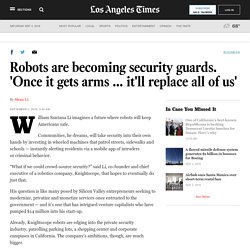
Communities, he dreams, will take security into their own hands by investing in wheeled machines that patrol streets, sidewalks and schools — instantly alerting residents via a mobile app of intruders or criminal behavior. “What if we could crowd-source security?” Said Li, co-founder and chief executive of a robotics company, Knightscope, that hopes to eventually do just that. His question is like many posed by Silicon Valley entrepreneurs seeking to modernize, privatize and monetize services once entrusted to the government — and it’s one that has intrigued venture capitalists who have pumped $14 million into his start-up.
Already, Knightscope robots are edging into the private security industry, patrolling parking lots, a shopping center and corporate campuses in California. EPIC domestic drones petition. FOIA - US Drones Intercept Electronic Communications and Identify Human Targets. EPIC FOIA - US Drones Intercept Electronic Communications and Identify Human Targets New records obtained by EPIC under the Freedom of Information Act indicate that the Bureau of Customs and Border Protection is operating drones in the United States capable of intercepting electronic communications.

The records also suggest that the ten Predator B drones operated by the agency have the capacity to recognize and identify a person on the ground. Approximately, 2/3 of the US population is subject to surveillance by the CBP drones. Domestic Drones.
EFF-Austin – Supporting digital freedom in Texas since 1990. Surveillance Drones. Surveillance drones or unmanned aerial systems (UASs) raise significant issues for privacy and civil liberties.
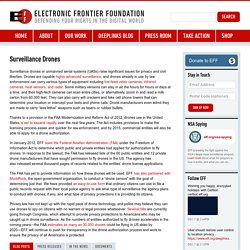
Drones are capable highly advanced surveillance, and drones already in use by law enforcement can carry various types of equipment including live-feed video cameras, infrared cameras, heat sensors, and radar. Some military versions can stay in air the hours for hours or days at a time, and their high-tech cameras can scan entire cities, or alternatively, zoom in and read a milk carton from 60,000 feet. They can also carry wifi crackers and fake cell phone towers that can determine your location or intercept your texts and phone calls. Drone manufacturers even admit they are made to carry “less lethal” weapons such as tasers or rubber bullets. Thanks to a provision in the FAA Modernization and Reform Act of 2012, drones use in the United States is set to expand rapidly over the next few years. Search. EFF in the News | February 27, 2013 - 4:32pm A full third of the applicants on the list – released after the Electronic Frontier Foundation filed a FOIA request – are colleges and universities. ... your location or intercept your texts and phone calls.

Drone manufacturers even admit they are made to carry “less lethal” weapons ... 2015, commercial entities will also be able to apply for a drone authorization. In January 2012, EFF sued the Federal Aviation ... Document | August 7, 2012 - 12:44pm. Domestic Drone Petition. David V.

Aguilar Deputy Commissioner U.S. Bureau of Customs and Border Protection 1300 Pennsylvania Avenue, N.W. Washington, D.C. 20229 Dear Mr. Aguilar: The undersigned organizations and individuals hereby petition the Bureau of Customs and Border Protection (“CBP”) to establish privacy regulations for the use of Unmanned Aircraft Systems (“UAS” or “drones”) in the United States. The use of drones for border surveillance presents substantial privacy and civil liberties concerns for millions of Americans across the country. Launches Petition to Suspend Government Drone Program.
Drone drones privacy UAV unmanned aerial vehicles EPIC Launches Petition to Suspend Government Drone Program.

Drone Census. No one, including federal airspace czars, seems to know with any authority just how many drones are flying around domestic airspace.
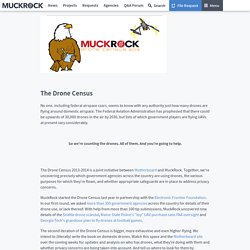
The Federal Aviation Administration has prophesied that there could be upwards of 30,000 drones in the air by 2030, but lists of which government players are flying UAVs at present vary considerably. Government plans expansion of domestic drones. While the government insists that they have no plans to carry out drone strikes within the borders of the United States, their actions speak otherwise.
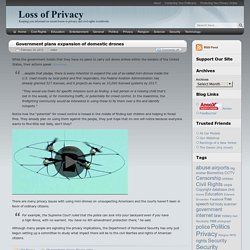
…despite that pledge, there is every intention to expand the use of so-called mini-drones inside the U.S. Used mostly by local police and first responders, the Federal Aviation Administration has already granted 327 licenses, and it projects as many as 10,000 licensed systems by 2017. Know Your Rights: The Government's 100-Mile "Border" Zone - Map. Many people think that border-related policies impact only people living in border towns like El Paso or San Diego.
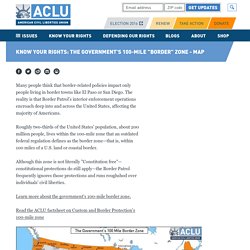
The reality is that Border Patrol's interior enforcement operations encroach deep into and across the United States, affecting the majority of Americans. Roughly two-thirds of the United States' population, about 200 million people, lives within the 100-mile zone that an outdated federal regulation defines as the border zone—that is, within 100 miles of a U.S. land or coastal border. Although this zone is not literally "Constitution free"—constitutional protections do still apply—the Border Patrol frequently ignores those protections and runs roughshod over individuals' civil liberties.
Learn more about the government's 100-mile border zone. Drone privacy and civil liberties Petition 2012 Feb. Drones.